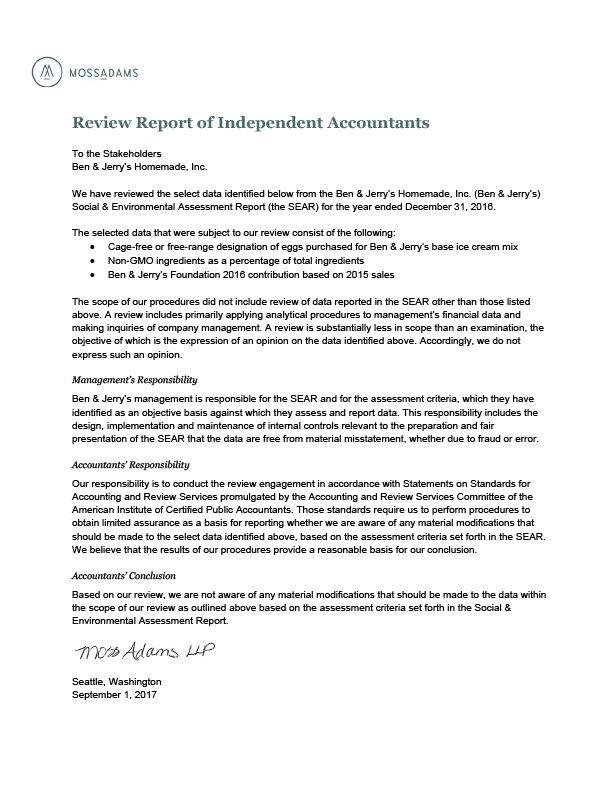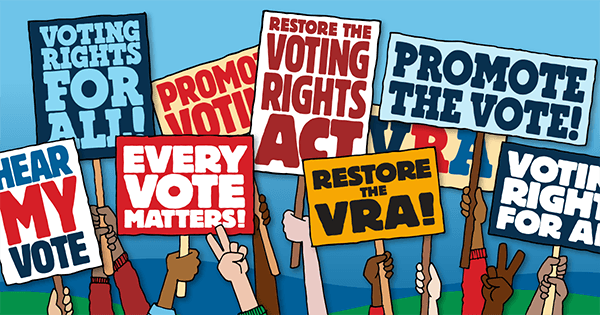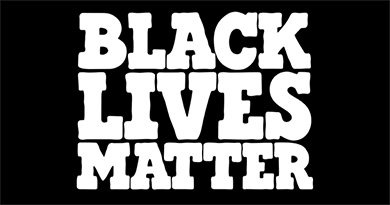2016 Social & Environmental
A LETTER FROM OUR CEO
Ben & Jerry’s is about so much more than ice cream; nearly 40 years ago, the Company started on a path that led us to create a simple, yet progressive, concept of “Linked Prosperity.” Linked Prosperity is the idea that as the Company grows & prospers, stakeholders all throughout our value chains – both internally & externally, prosper equitably. In practice, however, this concept is deceivingly challenging because it’s about much more than money; it’s about 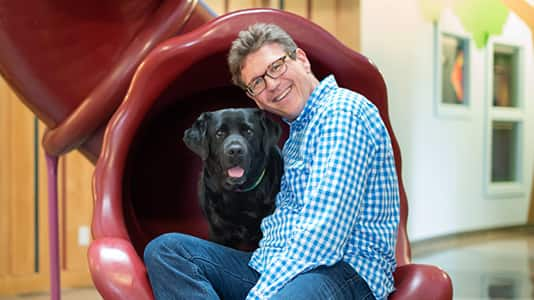 finding new and innovative ways of leveraging our business to benefit all stakeholders for the long-term.
finding new and innovative ways of leveraging our business to benefit all stakeholders for the long-term.
Every year we aim to raise the bar, to set more aggressive goals & to evolve what “business as usual” means. We don’t always get it right; we don’t always have an answer; and we acknowledge we are not perfect. But every year, we try hard to do more. When I arrived in Vermont in 2010, we were not yet committed to transitioning all products to Fairtrade certified; we had not yet committed to sourcing ingredients non-gmo by origin; we did not yet fully understand the carbon footprint of our business; and we were not yet a Certified B Corporation.
While I am extremely proud of these accomplishments, and find them exceptionally rewarding, I recognize we cannot rest on our laurels – and need to be all the more innovative over the next several years, several decades, really. But while we work on our strategy & goals for the future, I would like to take this opportunity to share with you the progress we made during 2016. Some of the highlights include:
- We raised the bar on standards throughout our dairy program, addressing the whole farm ecosystem (dignified livelihoods for farmers & farmworkers, animal welfare, soil health, water quality & reduced carbon footprint)
- We campaigned for social inclusion and community empowerment in Europe
- We continued our work to “get the dough out of politics” and combat voter suppression in the United States
- We continued our internal journey to become a more inclusive, diverse company; implementing new practices & trainings to understand our own implicit biases, so we can make the change we seek – both inside & outside our Company
I invite you to read our 2016 Social & Environmental Assessment Report (SEAR), and ask you to join us on our journey to make the world a little more open, just & equitable place, with every passing year.
Thank you for your continued support.
Peace, Love & Ice Cream
Jostein Solheim
CEO
Highlights in 2016
The Headlines
2016 was a tumultuous year. High stakes decisions were made around the world. Clear divisions became painfully evident. For us, it reaffirmed our view that now, more than ever, we need to raise the bar on our ambitions and work for outcomes that serve more of those who are marginalized: politically, socially, economically, environmentally. At Ben & Jerry’s, 2016 fit the theme of challenging ourselves during challenging times. How can we drive our values through the business, build a purpose-driven organization that succeeds at many levels and creates positive change throughout?
Making a positive impact requires a clear vision, focused priorities and a constant effort to achieve the goals we’ve set for ourselves. Our two main priorities from now until 2020 (and 2030, for that matter) are to address climate justice and social equity in substantive and relevant ways throughout our business. In that regard, 2016 will go down as an important year for setting high-bar benchmarks for our Social Mission priorities:
- We raised the bar on the standards throughout our Caring Dairy program, which addresses the whole farm ecosystem: dignified farmer and farmworker livelihoods, animal welfare, soil health, water quality, reduced carbon footprint.
- We started a comprehensive process of evaluating what the next level of standards will be in our dairy supply chain after Caring Dairy 2.0.
- We continued to strengthen our Fairtrade-certified supply chain beyond purchasing ingredients through producer development initiative projects in vanilla & cocoa.
- We’ve evaluated and started to implement the best technology and management systems to reduce our carbon footprint.
- We campaigned for voter rights and getting big money out of US elections.
- We campaigned for social inclusion and community empowerment in Europe.
- We campaigned in our Asia and Australian communities for enforcement of COP 21 agreements, LGBTQ rights and same sex marriage.
- We continued our own internal journey to become the inclusive, diverse company we envision by understanding our own implicit biases and implementing new practices so that we can make the change we seek inside and outside of our Company.
Annual Social Metrics Scorecard
Ben & Jerry’s has been issuing public reports on our social and environmental activities since our 1988 annual report, when we included a ‘Stakeholders Report’ under the same cover. While our business has evolved & grown over the years, we are proud to continue this tradition of measuring & reporting on our annual social & environmental performance. 2016 marked the seventh, and final, year we measure performance using our existing Quality of Results (QoR) scorecard, as we have made considerable strides toward achieving the goals we established so many years ago.
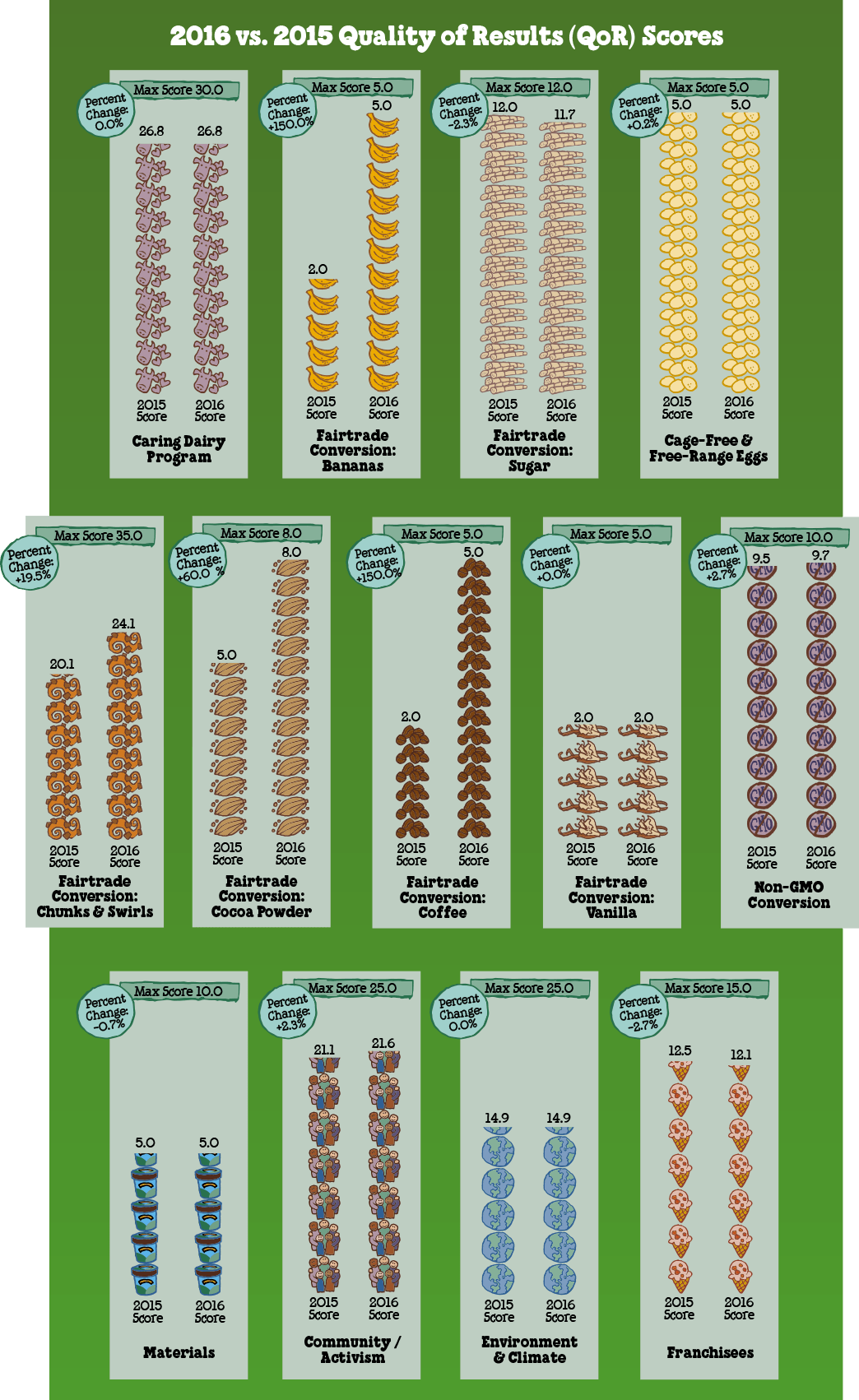 While this existing scorecard format will retire with the 2016 SEAR, have no fear – as we will be introducing a new, more ambitious, set of metrics for year-end 2017. Our belief is that our new metrics, and the underlying methodology, will better guide us in achieving the long-term social & environmental objectives we have set for the business. Furthermore, it will allow us to identify circumstances in which performance appears to be falling short of expectations, so we can investigate the root cause & take corrective action as soon as possible.
While this existing scorecard format will retire with the 2016 SEAR, have no fear – as we will be introducing a new, more ambitious, set of metrics for year-end 2017. Our belief is that our new metrics, and the underlying methodology, will better guide us in achieving the long-term social & environmental objectives we have set for the business. Furthermore, it will allow us to identify circumstances in which performance appears to be falling short of expectations, so we can investigate the root cause & take corrective action as soon as possible.
At the heart of the new QoR methodology is a goal to redefine the way Ben & Jerry’s measures and evaluates year-on-year social performance. Under the existing QoR framework, over two-thirds of all points are allocated based on inputs. Going forward, however, we seek to raise the bar with the introduction of this new QoR framework, by allocating points based on outcomes. Under the proposed methodology, annual social performance will be measured based on performance against defined goals & targets. The intention is to transition the dialogue at the year-end meeting from “What percent of our cocoa powder was purchased Fairtrade-certified?” to more of a discussion around “Are we creating living incomes for our cocoa farmers?”
For our 2016 report, we again engaged Moss Adams LLP, an independent accounting firm, to review specific QoR indicators that Ben & Jerry’s set as priorities for the year. You can read Moss-Adams’ review here.
Our Company
How We Work
Since our acquisition in 2000, Ben & Jerry’s remains a wholly owned subsidiary of Unilever. Today, our packaged ice cream, novelties & new non-dairy products are sold all over the world, primarily as packaged products through retail outlets. Additionally, our euphoric flavors can be found in one of our many scoop shop outlets, which operate, as of 2016, in about 22 different countries!
Our products are produced in pints, quarts, 500 ml cups, 2.4 gallon, 9.08 liter and 4.5 liter tubs, single-serve cups and individual novelties; and these are distributed in supermarkets, grocery stores, convenience stores, scoop shops, restaurants and other venues. By the end of 2016, Ben & Jerry’s products were marketed and distributed throughout the world by affiliated companies within Unilever, and a third-party licensee in Israel.
In terms of the basics, Ben & Jerry’s global business is managed out of our Central Support offices in South Burlington, Vermont. Ben & Jerry’s sits within Unilever’s Refreshments division, which is managed globally out of London and regionally from Unilever offices in Englewood Cliffs, New Jersey.
Governance
Based on a unique acquisition agreement, Ben & Jerry’s and Unilever set up a governance structure that was unprecedented at the time and served to keep Ben & Jerry’s thriving in perpetuity as a values-led company.
Ben & Jerry’s Board of Directors
 Our CEO, Jostein Solheim, receives direction, counsel and support from an independent Ben & Jerry’s Board of Directors (the Board), established at the time of the Unilever acquisition.
Our CEO, Jostein Solheim, receives direction, counsel and support from an independent Ben & Jerry’s Board of Directors (the Board), established at the time of the Unilever acquisition.
The Board is responsible for Ben & Jerry’s Social Mission and the Essential Integrity of Ben & Jerry’s, which includes, among other things, product quality and standards. In this role, the Board advises and supports Ben & Jerry’s senior management in maintaining and strengthening the Company’s three-part Mission Statement and protecting Ben & Jerry’s brand equity. As the business continues to grow globally, the Board remains focused on making sure the Company’s three-part mission remains intact and at the core of what we do.
Throughout 2016, the Ben & Jerry’s Board continued its work focusing the Company on its over-arching business vision of a sustainable model of Linked Prosperity for all of Ben & Jerry’s stakeholders, from seed to freezer. Moreover, the Board was deeply involved in leading management and the entire Ben & Jerry’s organization in examining issues of race, class and gender equity – inside & outside the organization.
The Ben & Jerry’s Board is made up of global leaders in social, economic and environmental advocacy and activism. Our Board is growing more diverse and has been proactive in recruiting new members with the experience and expertise they will need to address the complex issues we will face in years to come.
The Board meets in full on a quarterly basis, and conducts ongoing committee work throughout the year.
Our 3-Part Mission
Ben & Jerry’s is founded on and dedicated to a sustainable corporate concept of Linked Prosperity. Our mission consists of three interrelated parts:

Central to the Mission of Ben & Jerry's is the belief that all 3 parts must thrive equally in a manner that commands deep respect for individuals in & outside the Company & supports the communities of which they are a part.
While the principles underlying the three part mission help guide our day-to-day decisions, our Progressive Values Statement serves as an enduring reminder of our core beliefs.
Leading with Progressive Values Across Our Business
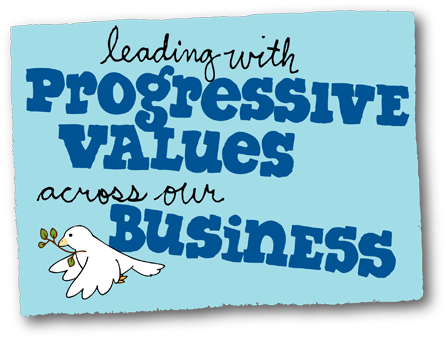
We have a progressive, nonpartisan Social Mission that seeks to meet human needs and eliminate injustices in our local, national, and international communities by integrating these concerns into our day-to-day business activities. Our focus is on children and families, the environment and sustainable agriculture on family farms.
- Capitalism and the wealth it produces do not create opportunity for everyone equally. We recognize that the gap between the rich and the poor is wider than at any time since the 1920s. We strive to create economic opportunities for those who have been denied them and to advance new models of economic justice that are sustainable and replicable.
- By definition, the manufacturing of products creates waste. We strive to minimize our negative impact on the environment.
- The growing of food is overly reliant on the use of toxic chemicals and other methods that are unsustainable. We support sustainable and safe methods of food production that reduce environmental degradation, maintain the productivity of the land over time, and support the economic viability of family farms and rural communities.
- We seek and support nonviolent ways to achieve peace and justice. We believe government resources are more productively used in meeting human needs than in building and maintaining weapons systems.
- We strive to show a deep respect for human beings inside and outside our company and for the communities in which they live.
B Corp Certification
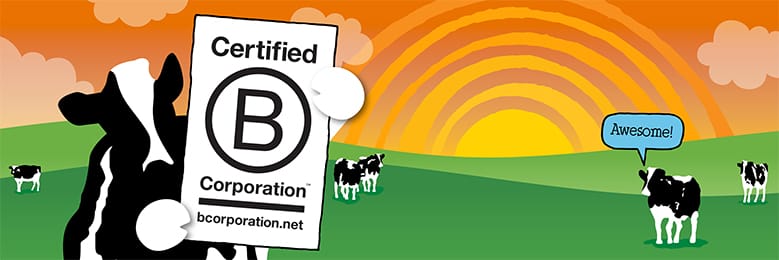
Certified B Corporations, commonly known as B Corps, are a new type of corporation that uses the power of business to solve social and environmental problems. Certified B Corps must satisfy a rigorous assessment by the non-profit B Lab that covers: corporate governance, worker benefits, community engagement and environmental performance.
In 2012, Ben & Jerry’s became the first wholly-owned subsidiary in the world, with full support from our parent company, Unilever, to gain B Corp Certification!
In late 2016, we completed our third recertification cycle (a two-year term), increasing our overall score on the B Impact Assessment to 110 points (up from 101 in 2014)!
The B Corp community is challenging itself and its member B Corps to counter the recent trend of divisive social and political actions by building an inclusive economy.
Learn more about Ben & Jerry’s joining the B Corp movement.
Learn more about B Corporations and view Ben & Jerry’s Impact Assessment.
Operations
Ben & Jerry’s products for the North American market are made in our manufacturing plants in Waterbury and St. Albans, Vermont, as well as in a Unilever facility in Henderson, Nevada. In 2016, we began manufacturing our new line of Ben & Jerry’s ‘Pint Slices’ at a Unilever facility located in Covington, Tennessee. Additionally, we continue to make products for the Canadian market in a Unilever facility in Simcoe, Ontario.
During 2016, Ben & Jerry’s products for European markets were produced at a Unilever factory in Hellendoorn, the Netherlands; while the ‘Wich’ novelty sandwiches were made by a co-packer in Greece.
Products for Asia, Australia & Brazil were exported from these U.S. and European facilities.
During 2016, approximately 125 employees reported in to Ben & Jerry’s Central offices in South Burlington, Vermont. During this same period, our Vermont Manufacturing sites continued to employ more than 350 people in and around the communities of St. Albans & Waterbury, Vermont.
Code of Business Principles
All of the suppliers for Ben & Jerry’s ice cream are expected to follow practices consistent with the Code of Business Principles of our parent company, Unilever. This code includes: continuous improvement in managing environmental impacts, safe and healthy standards for workers, and a firm commitment to human rights, among other things. Unilever is also a signatory to the U.N. Secretary General’s Global Compact of 1999, which commits the company to support and respect human rights within our sphere of influence.
Values-Led Sourcing (VLS)
VLS Overview
The iconic Ben & Jerry’s flavors that everyone has come to know & love are only made possible through the extraordinary efforts of the many stakeholders, located all throughout our value chains. After all, what would our ice cream be without the cream from our dairy farmers? What would New York Super Fudge Chunk® be without cocoa from our cocoa farmers? What would Half Baked® be without those great chunks of chewy brownies from Greyston Bakery & gobs of cookie dough from Rhino Foods?! We’d like to increase our partnerships with Values Led Suppliers and establish more relationships with smallholder producers. The goal is to use our purchasing power to create economic opportunities for those who have not had access to them. In 2015, our work with the Producers Development Initiative, helped move us forward on this goal.
Over the last year, we’ve continued to work toward our goal of expanding partnerships with Values Led Suppliers. We are building more meaningful & effective relationships with new and existing smallholder producers. And we put a clear emphasis on addressing workers’ rights. Since we make a lot of ice cream all over the world, our goal has been to leverage our purchasing power to create economic opportunities for those who have not had equitable access to them. Essentially, this is a major way linked prosperity is practiced within our value chains – as we grow and thrive as a business, we also continue working hard to ensure that we’re bringing our stakeholders along with us.
Supporting B-Corps & Social Enterprises
Way back in 2012, we initiated a process to better define what it means to be a Ben & Jerry’s Values-Led Sourcing (VLS) supplier. We found our friends at B Lab had developed a comprehensive measurement tool called the B Impact Assessment that aligned nicely with our own values and criteria. Over the last few years, we’ve looked at our business relationships through the lens of various tools, such as the B Impact Assessment standards, in addition to a host of other socially progressive indicators and metrics.
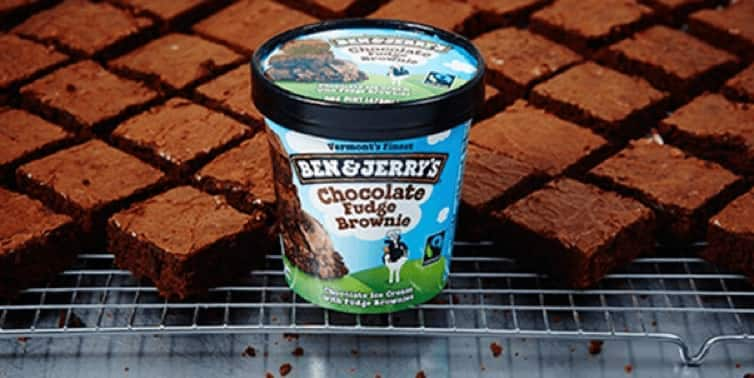 During 2016, we continued to recognize our suppliers, Greyston Bakery and Rhino Foods, as a full-fledged VLS partners:
During 2016, we continued to recognize our suppliers, Greyston Bakery and Rhino Foods, as a full-fledged VLS partners:
The Greyston Bakery
Based in Yonkers, New York, Greyston Bakery has been supplying Ben & Jerry’s with chocolate brownies for our Chocolate Fudge Brownie flavor for close to three decades. At Greyston, producing great baked goods is part of their greater-good mission to provide jobs and training to low-income city residents.
The Bakery is owned by the Greyston Foundation, a nonprofit organization with a mission to support people with barriers to employment on the path to self-sufficiency. Through their open door hiring policy, when a job becomes available, the next person on the waiting list is given a job starting in an apprentice program, no questions asked.
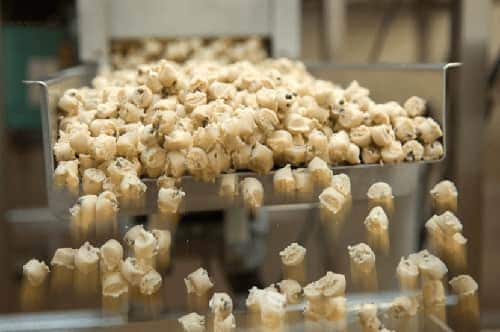 Greyston’s programs reach over 2,000 people a year through child care, housing, counseling, health care, and other services. Over the lifetime of our business relationship with Greyston, over 3,200 jobs have been created through the Bakery and over 19,000 families have benefitted through the Greyston organization’s programs and services. Furthermore, Greyston is a certified B Corporation (B Corp), which means they satisfy a rigorous criteria to earn B-Corp status, alongside a growing community of companies that include a social purpose alongside their product and economic missions.
Greyston’s programs reach over 2,000 people a year through child care, housing, counseling, health care, and other services. Over the lifetime of our business relationship with Greyston, over 3,200 jobs have been created through the Bakery and over 19,000 families have benefitted through the Greyston organization’s programs and services. Furthermore, Greyston is a certified B Corporation (B Corp), which means they satisfy a rigorous criteria to earn B-Corp status, alongside a growing community of companies that include a social purpose alongside their product and economic missions.
Rhino Foods
Rhino Foods is another longtime supplier that makes those incredible gobs of cookie dough we use in our Chocolate Chip Cookie Dough ice cream. Based right here in Burlington, Vermont, Rhino became a certified B Corp in 2013.
Over the years, Rhino has developed a variety of programs that support its employees and the surrounding community. Rhino employs dozens of people who have come to the United States as refugees from all around the world. Through a unique variety of support programs, Rhino helps these and all of its employees to earn a living, save money, develop a credit history, and make a new life for themselves and their families.
Other B-Corps in Our Value Chain
In 2014 we began piloting the B Impact Assessment tool with a handful of key suppliers. This new tool gave us a great benchmarking framework and helps us understand where our suppliers stand, in comparison to other companies. We are proud to have recognized the efforts of other companies with whom we work, at various levels and stages of our value chain.
- Oregon Cherry Growers Based in Oregon, Oregon Cherry Growers became a certified B-Corp in 2016! For years, Oregon Cherry Growers has supplied those wonderful cherries that make everyone so grateful for that scoop of Cherry Garcia.
- Sustainable Harvest Sustainable Harvest® is an importer of high quality specialty-grade coffees from over 15 countries around the world. In addition to being a key actor in our Fairtrade coffee value chain, Sustainable Harvest® is also a certified B-Corp.
- Macphie Based in Scotland, Macphie is a supply partner for the cookie dough used in Ben & Jerry’s products made in the EU. In 2015, Macphie became one of the first UK companies to achieve B-Corp certification.
- NativeEnergy NativeEnergy is an expert provider of carbon offsets, renewable energy credits, and carbon accounting software. NativeEnergy helps businesses and individuals identify and reduce their greenhouse gas pollution and attain their sustainability goals. Based in Burlington, Vermont, NativeEnergy is also a certified B-Corp.
Additional Values-Led Sourcing Initiatives
From our sustainable dairy program, Caring Dairy™, to our Fairtrade-certified ingredients and non-GMO sourcing, to ingredients made for us by social enterprises, all of these sourcing decisions we make are deeply rooted in our values.
Caring Dairy Program
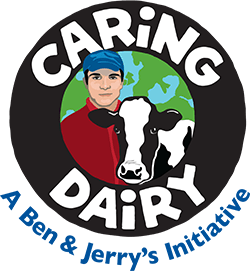
The Caring Dairy program offers farmers in the U.S. and Europe a way to measure and improve social, economic & environmental standards on their dairy farms. In 2016, we rolled out Caring Dairy 2.0, which greatly raised the bar on the minimum performance standard for each of the program’s indicators, which are designed to result in improvements to dairy farmer and farmworker livelihoods, improved animal welfare, healthy soil, clean water and a reduced carbon footprint.
Additionally, with the introduction of Caring Dairy 2.0, we transitioned to a tiered compensation structure of Gold, Silver & Basic, where farmers have the opportunity to earn higher premiums, depending on their level of participation & adoption of higher standards.
Learn more about Caring Dairy™.
Milk with Dignity
Farm labor is a critical part of a successful dairy business. The employment of non-family farm labor is typically based on the size of the farm’s herd. 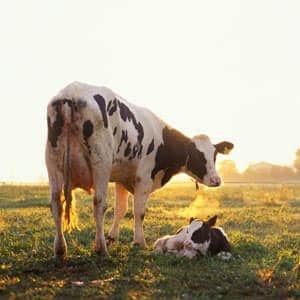 Access to local farm labor has been a struggle for many farms and therefore many rely on migrant labor. Ben & Jerry’s is committed to the human rights of all farmworkers and is in a dialogue with Migrant Justice, a Vermont-based non-profit organization, to change the Farm Labor section of Caring Dairy to a farmworker-led initiative called Milk with Dignity. We believe that a worker-led program will better support the needs of both farmworkers and farmers alike over time. Our discussions with Migrant Justice regarding the details of how to successfully implement the Milk with Dignity program within our dairy supply chain have not yet reached a conclusion, but we remain focused on achieving a constructive and successful outcome.
Access to local farm labor has been a struggle for many farms and therefore many rely on migrant labor. Ben & Jerry’s is committed to the human rights of all farmworkers and is in a dialogue with Migrant Justice, a Vermont-based non-profit organization, to change the Farm Labor section of Caring Dairy to a farmworker-led initiative called Milk with Dignity. We believe that a worker-led program will better support the needs of both farmworkers and farmers alike over time. Our discussions with Migrant Justice regarding the details of how to successfully implement the Milk with Dignity program within our dairy supply chain have not yet reached a conclusion, but we remain focused on achieving a constructive and successful outcome.
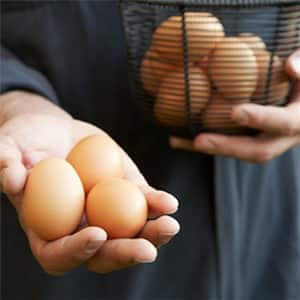 Cage-Free & Free-Range Eggs
Cage-Free & Free-Range Eggs
In North America, the eggs we buy for Ben & Jerry’s ice cream base-mix come from hens on Certified Humane cage-free farms. Certified Humane cage-free standards ensure that laying hens have wholesome, nutritious food, access to clean water, and adequate space to engage in normal behaviors, among other criteria crafted by veterinary professionals. In Europe, the sugared egg yolks we source come from free-range hens.
Fairtrade Products & Initiatives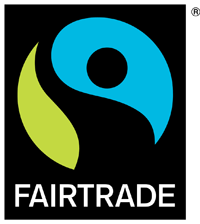
The fair trade movement is important because it assures that small-scale farmers’ get a fair price for their products, benefitting their families & their communities. In return, all farmers in the fair trade system agree to use environmentally friendly farming practices, implement fair labor standards and invest in their communities. Through our partner, Fairtrade International, the Fairtrade social premium – an additional amount of money paid on top of the fair price that farmers receive – helps to make those investments happen.
Fairtrade Producer Development Initiative
The goal of the Ben & Jerry’s Producer Development Initiative (PDI) is to innovate and invest in our main Fairtrade supply chains, in order to support the farmers in those supply chains to become better business partners and achieve a living income in agriculture.
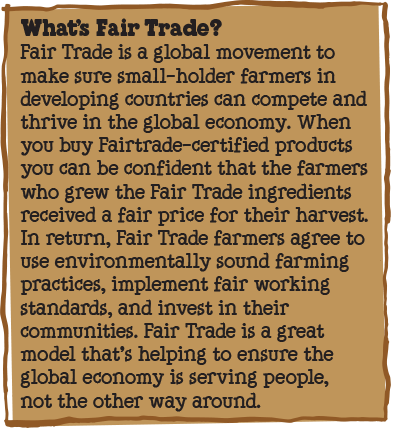 The PDI strategy operates through three work-streams:
The PDI strategy operates through three work-streams:
- Addressing Climate resilience and climate change challenges that our Fairtrade farmers are facing. We recognize that farmers in the Global South are dealing with significant shifts in their crop productivity due to changing rainfall patterns, pestilence etc. The PDI aims to support farmers with access to the necessary resources to understand and mitigate the risk of crop failure.
- Goal setting around “Closing the Gap” with a Living Income benchmark. The PDI will work with partners to evaluate what it would take to close the gap between current farmer household incomes and a Living Income benchmark. This work involves:
- Determining a living income benchmark
- Gathering data on current farm and household conditions
- Deliberating with stakeholders, including farmers, about how programs and investments could help to ‘Close the Gap’.
- Building cooperative capacity and strengthening the cooperative enterprise model. Cooperatives operate on a democratic model, enabling farmers to self-organize to access markets and leverage efficiencies. The PDI aims to support these farmer organizations in becoming strong actors, with true negotiating power, in their Fairtrade value chains.
The PDI works across 3 platforms: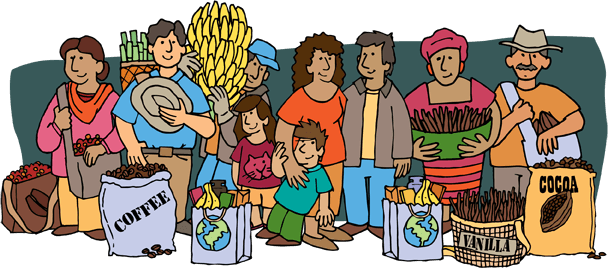
- Invest in direct interventions with farmers
- Innovate in trading relationships through the supply chain; from the cooperative through to the ingredient supplier
- Lead in industry influencing to build momentum in improving the enabling environment and scaling impact
PDI Project Work
Over the course of 2016, following extensive research, planning and engagement, Ben & Jerry’s – with the help of our multiple stakeholders & partners on the ground – 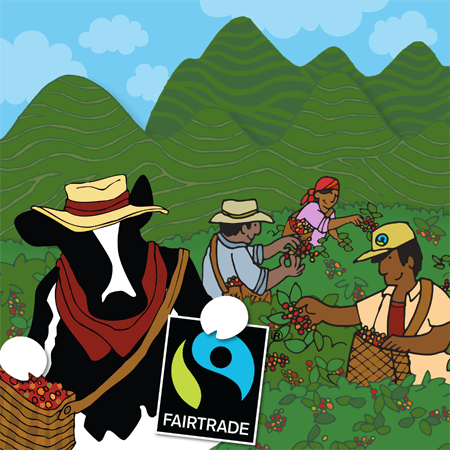 made considerable strides toward implementing ambitious PDI projects in some of our key commodity value chains.
made considerable strides toward implementing ambitious PDI projects in some of our key commodity value chains.
Some of the highlights from our 2016 PDI project work included: Identifying cocoa cooperatives for the productivity program in Cote d’Ivoire; a visit to the Revitalizing Vanilla project in Uganda, with a focus on improved sector governance and buyer coordination; & finalizing the designs for our initial PDI project in sugar, which will take place in El Salvador.
Cocoa Project: Cote d’Ivoire
Cocoa is one of Ben & Jerry’s largest Fairtrade ingredient purchases; we purchase it directly for use in our chocolate base-mixes, as well as indirectly in all those incredible chunks & swirls that everyone raves about. 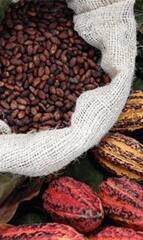 To date, Fairtrade cocoa has been bought through the mass-balance system without any direct connections to specific cooperatives; but going forward, our goal is to better understand the impact our business is having on cocoa farmers, and ensure the existence of a linked prosperity relationship.
To date, Fairtrade cocoa has been bought through the mass-balance system without any direct connections to specific cooperatives; but going forward, our goal is to better understand the impact our business is having on cocoa farmers, and ensure the existence of a linked prosperity relationship.
Therefore, a phased strategy has been adopted for PDI projects in cocoa, with the expectation that it will layer-up to build the strong foundation required to provide farmers & their communities with a more sustainable livelihood through greater organizational strength, farmer incomes, and climate resilience.
Phase 1: Identify and commercial testing with specific cooperative partners (completed)
Phase 2: Build a solid foundation for farmer cocoa co-investment (May ‘16 – Sept ‘17)
Phase 3: GAP and inputs productivity program full launch (launch Sept 2017, ongoing)
Phase 4: Long term climate smart renovation, i.e. replanting (design in 2017, launch in 2018)
In 2016, the Cocoa PDI achieved 100% direct engagement sourcing for the base mix purchase made by Unilever (not chunks and swirls which is second tier supply). Organizational development and productivity project components were launched for a first 3-year phase. The target of this phase is to engage 3,200 farmers through the cooperative strengthening, 1,800 farmers in productivity overall program, and 450 farmers in the full productivity package improvement work.
This work has the long term potential to double farmer incomes from cocoa and achieve a living income, but faces challenges around the large scale replanting required to achieve the needed productivity due to aging trees and naturally declining yields.
Sugar Project: El Salvador
 Sugarcane small holder farmers struggle with economic viability due to very low Fairtrade demand relative to production. This will be further exacerbated by upcoming changes in the EU quota systems in 2017, given the EU market demand for imported cane sugar is expected to steeply decline as domestic EU beet sugar production escalates. This could potentially force Fairtrade sugarcane farmers, particularly in Africa, to find a replacement market. As well, labor, health, and environmental management concerns persist across the whole sugar industry.
Sugarcane small holder farmers struggle with economic viability due to very low Fairtrade demand relative to production. This will be further exacerbated by upcoming changes in the EU quota systems in 2017, given the EU market demand for imported cane sugar is expected to steeply decline as domestic EU beet sugar production escalates. This could potentially force Fairtrade sugarcane farmers, particularly in Africa, to find a replacement market. As well, labor, health, and environmental management concerns persist across the whole sugar industry.
Ben & Jerry’s North American supply chain has about 9,300 sugar cane farmers through the mass-balance supply from Latin America. Over the course of 2016, the PDI team has worked hard to formulate a strategy to identify & support sugar cane farmers. The result is a project developed in El Salvador to support investment in irrigation to improve climate resiliency and competitiveness with large scale production. Co-investment has been secured from the mill and the cooperative and a first hydrological study has been reviewed to ensure water resources are sufficient. We look forward to kicking off the project in 2017.
Vanilla Projects: Madagascar & Uganda
 Vanilla is the quintessential flavor associated with ice cream. Ben & Jerry’s is no exception. The PDI is laying a foundation during a period when deeper investment in the vanilla industry is critical. The market is currently facing extremely high and volatile prices which have resulted in systemic quality problems and challenges at the farm level including vanilla theft from farmer’s fields. The past market pattern has been short periods of very high price (with low quality) followed by long periods of extremely low prices.
Vanilla is the quintessential flavor associated with ice cream. Ben & Jerry’s is no exception. The PDI is laying a foundation during a period when deeper investment in the vanilla industry is critical. The market is currently facing extremely high and volatile prices which have resulted in systemic quality problems and challenges at the farm level including vanilla theft from farmer’s fields. The past market pattern has been short periods of very high price (with low quality) followed by long periods of extremely low prices.
Madagascar
Madagascar is currently the primary global origin for the vanilla industry, producing over 80% of the world’s vanilla. Due to extreme market volatility, as well as other sourcing dynamics, the PDI has decided to focus first on sectoral improvement efforts, delaying the direct linked prosperity supply chain work until 2017.
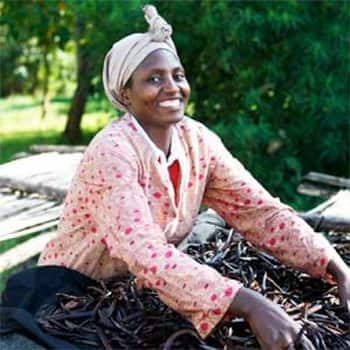 Current efforts include an agreement with Fairtrade International to launch a cooperative strengthening program for four Fairtrade cooperatives & continued engagement through Sustainable Vanilla Initiative (SVI) to improve sector governance, market stability, & vanilla quality.
Current efforts include an agreement with Fairtrade International to launch a cooperative strengthening program for four Fairtrade cooperatives & continued engagement through Sustainable Vanilla Initiative (SVI) to improve sector governance, market stability, & vanilla quality.
Uganda
Ben & Jerry’s continues to have an exciting opportunity through the PDI to lead revitalization of the vanilla industry in Uganda.
The PDI project investment, which began Q3’15, has created a unique leadership opportunity for Ben & Jerry’s. Our 3-year project, with an investment of $500,000, partnered with the newly formed Rwenzori Farmers’ Cooperative Union (RFCU), who work with over 2,000 farmers to: improve vanilla quality and productivity; strengthen the farmer organization; & improve the sector management of vanilla.
Almond Project: Middle East
Ben & Jerry’s uses almonds in our non-dairy product supply chain so the PDI decided to explore opportunities to support almond farmers, choosing to partner with Canaan Fair Trade and the Palestine Fair Trade Association.
Almond is a very promising high-value crop for local farmers. Not long ago, farmers were cutting down trees because of the lack of marketing opportunities, but now they are planting more trees because of the good markets opened through Fair Trade via Canaan Fair Trade. However, the crop still faces numerous challenges. Productivity is well below the potential because almond wasp has devastated the crop (50-60% yield reduction in recent years). High quality seedlings are difficult to access, farmers have not been successful in the incidence of almond wasp attack, incorrect pollination methods are being employed, and farmers are not providing sufficient water needed for optimal production. Currently, farmers are earning about $3,000 /year from almonds.
The PDI is supporting the Canaan Center for Organic Research and Extension (CORE) in a multi-year process to increase net incomes for approximately 300 almond farmers. The project aims to double almond yields from the current 500 kg / hectare yield to 1,000 kg / hectare, add value through improved quality and organic certification, and reduce production costs through sustainable agriculture practices. CORE estimates that project level interventions have the ability to help farmers improve their incomes over time from $3,000 to $15,000 per household.
Almonds Phase I Project Summary
The Developing Almond Crop by Improving Seedling Quality and Pollination project was implemented by CORE from December 2015 to December 2016 with the goal of improving the local almond sector. As a result of the project, the cultivation of economically promising, high-quality almond trees was significantly increased in the West Bank.
Almond seedling quality was improved:
- Type-verified grafting materials of the Hassan el Asaad varietal and pollinator varieties were introduced to and used by nurseries
- Nursery owners were advised on best practices specific to almond seedlings production
- The project team followed up on the seedling production steps. As a result, farmers received high-quality seedlings to initiate their orchards or to replace dead trees of existing orchards with high-quality pollinator seedlings.
Project achievements:
The project team encouraged farmers to plant new almond orchards and to better manage existing orchards. Almond crop cultivation in the area has increased as technical issues facing almond farmers have been overcome, leading to improved productivity. In 2015, farmers belonging to the Palestine Fair Trade Association PFTA (the main pool of beneficiaries of this project) produced ~ 180K kg of almonds, the number increased by ~80K kg in 2016 (45%). 20,000 almond seedlings (Hassan el Asaad varietal) were produced at two selected nurseries under the supervision and follow-up of CORE, and then purchased and distributed to farmers. 119 farmers received seedlings and planted around 700 dunoms (70 hectares) of new almond orchards.
In the next few years, the improvements in productivity will appear even clearer as pollinators planted in previously poorly pollinated orchards will grow and reach maturity. The overall production will also increase as the newly planted orchards will start producing in 2 years’ time.
In addition, an agreement was made with Canaan Palestine, the main Fair Trade exporting channel of the PFTA, to pay a price premium of 5% for almonds produced during the conversion period (in-conversion), which provided a significant incentive for convincing farmers to immediately begin certification procedures. By December 2016, 80 farmers began the process of conversion to organic production. Once organic certification is achieved, the farmers will receive a premium of 10%.
Fairtrade Certification was provided to all beneficiary farmers, resulting in $0.95 price premium added to each kilogram of produce. The volume of almonds that the PFTA farmers exported through fair trade channels increased six-fold in 2016 primarily because of Ben & Jerry’s purchase for our non-dairy line.
Non-GMO Sourcing
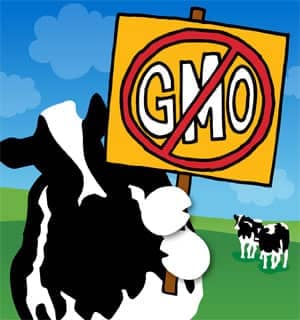 What are GMOs?
What are GMOs?
Genetically modified organisms, or GMOs, are organisms that have been created using gene-splicing techniques, which allow DNA from one species to be injected into another species in a laboratory. This creates combinations of plant, animal, bacteria, and viral genes that do not occur in nature or through traditional cross-breeding methods. The most common kinds of GMOs include some varieties of corn, soybeans and other crops that have had their DNA altered to be resistant to chemical herbicides and/or produce their own pesticides.
Our Products
Ben & Jerry’s sources our ingredients to a standard we call ‘non-GMO by origin.’ This means that every plant-based ingredient we use in our products is derived from crops grown from Non-GMO seeds, as assured by our suppliers.
In Europe and Asia, Ben & Jerry’s products continue to be compliant with local requirements for non-GMO ingredients.
Dairy Components
Just so you know, our ice cream base mix is already totally non-GMO by origin because the ingredients we use are not at risk for GMO sources. However, the fresh milk and cream, from herds not treated with rBGH that our family farmers supply to us, is not organic. Therefore, it is almost certain that some portion of the cows’ feed contains GMO ingredients, such as corn and soy. Since neither the cow nor the milk and cream they provide us are genetically modified, our products would not be required to be labeled as GMO. We understand the complex issues around GMO animal feed and we are looking into how we can best develop cost effective non-GMO feed options for the family farms that supply our milk and cream.
Over the course of 2016, Ben & Jerry’s remained engaged at several levels in supporting the growth and development of a robust non-GMO food supply. At the heart of our actions is a long-term vision of systemic change that creates more options for non-GMO foods and ingredients.
Our work in this area is focused on:
- Converting our own products to non-GMO ingredients by origin
- Supporting a consumer’s right to know through mandatory product labeling
- Working to rebuild a robust system of non-GMO agriculture
Supporting Consumers’ Right to Know
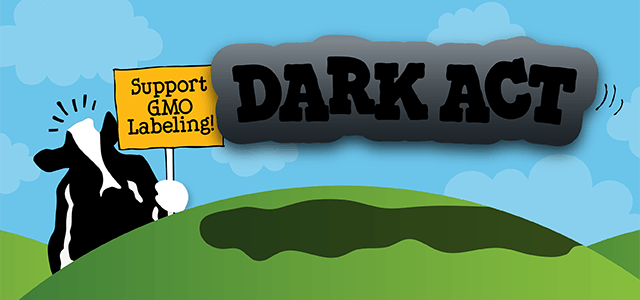 Ben & Jerry's has been proud to stand with the growing consumer movement fighting for transparency and the right to know what’s in our food supply. Over the past several years, we worked hard to support campaigns to win mandatory on-packaging GMO labeling. We were incredibly proud that our own small state of Vermont became the first in the nation to pass and implement mandatory on-pack labeling.
Ben & Jerry's has been proud to stand with the growing consumer movement fighting for transparency and the right to know what’s in our food supply. Over the past several years, we worked hard to support campaigns to win mandatory on-packaging GMO labeling. We were incredibly proud that our own small state of Vermont became the first in the nation to pass and implement mandatory on-pack labeling.
However, this victory was short lived. The United States Congress passed the DARK Act (Deny Americans the Right to Know Act) which preempted all states, including Vermont, from requiring the disclosure of GMO ingredients on food packages. Instead the DARK Act allows companies to use 800 numbers, websites, or other digital solutions that make it more complicated for people to learn whether or not a product contains GMO ingredients.
rBGH
Since 1989, Ben & Jerry’s has opposed the use of recombinant bovine growth hormone (rBGH), a genetically engineered hormone given to cows to increase their milk production.1 We think rBGH is a step in the wrong direction towards a chemically-intensive, high-tech food system that has unacceptable social and environmental costs.
Our milk comes from the St. Albans Cooperative in Vermont, made up of about 400 family farmers; and we have required all of our farmers to pledge not to treat their cows with rBGH. In the Netherlands, where we produce ice cream for the European market, we buy milk from CONO Cheesemakers, made up of about 500 family farmers & Friesland Campigna; rBGH is not even legal in the Netherlands, so it’s one less thing we have to worry about! We also source dairy for smaller production quantities in Henderson, NV and Simcoe, Ontario, Canada, which also come from herds that are not treated with rBGH.
While our products have for decades come from cows not treated with rBGH, we continue to work with a coalition of nonprofit groups and companies in the U.S. to defend the consumer's right to know.
Synthetic Biology
We are aware that some food ingredients may soon be available on the market that are derived from new applications of genetic engineering techniques and approaches sometimes referred to as synthetic biology. We consider the food ingredients produced in this way to be inconsistent with Ben & Jerry’s criteria for sourcing and therefore we will not use them in our products.
1 The FDA has said no significant difference has been shown & no test can now distinguish between milk from rBGH treated & untreated cows.
Engaging Our Communities
Employee Community Service Projects
We seek to connect our employees to the communities in which we live & work, while at the same time provide team-building experiences and learning opportunities in the broader world. Therefore, we strongly encourage they find opportunities to volunteer their time working for nonprofit organizations of their own choosing.
A strong sense of community is at the heart of Ben & Jerry’s concept of Linked Prosperity, so we’ve gone so far as to write a couple different volunteer programs into our ‘People Practices.’ The goal of these policies is to ensure our employees have the opportunity to take a time-out to lend a hand to their neighbors.
Bucket Brigade Community Volunteering Program
The Bucket Brigade Community Volunteers Program provides Ben & Jerry’s employees with time each calendar year for company paid time off for volunteer work with local community service programs. When employees volunteer on Company-paid time, we encourage them to pursue activities that align with the Company’s core values and priorities, such as:
- Meeting essential human needs, especially for families and children
- Creating economic opportunities for those who have been denied them
- Protecting the environment
- Supporting safe and sustainable food production, family farms, and rural communities
- Promoting nonviolent ways to achieve peace and social justice
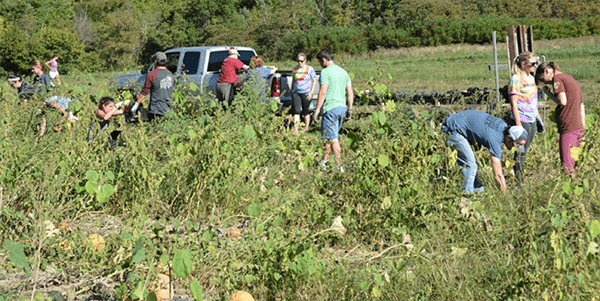 Community Action Teams (CATs)
Community Action Teams (CATs)
Every year, Community Action Teams (CATs), from each of our Vermont sites, organize for day of action in support of local organizations, institutions & public spaces. These days usually include activities such as fixing, cleaning, building, & painting – along with many other activities that help improve the quality of life for our communities.
Vermont Manufacturing Projects
In 2016, CATs from our Vermont Manufacturing sites completed multiple volunteering projects – some of the activities included: completing yard work, painting, cleaning, and other preparatory activities at Camp Abanaki, Camp Hochelaga & Camp Ta-Kum-Ta; in addition to a variety of community-based projects in the St. Albans, Vermont area.
Central Support Site Project
In October 2016, Ben & Jerry’s employees from our Central (South Burlington, VT) Office, volunteered their time gleaning apples for Salvation Farms. The three gleaning events yielded roughly 15,000 lbs. of apples! Most of the apples travelled to the new Vermont Commodity Program in Winooski, Vermont, where they were to be washed & packed into 5 lb. bags. As a result, approximately 3,000 five-pound bags of apples were made available to food shelves & health care shares for Vermonters in need!
Global Franchise Meeting Event
During the recent Global Franchise Meeting in Orlando, Florida, teams of Ben & Jerry’s employees & members of our Franchise network came together for a volunteer event in support of the non-profit, Hands on Orlando.
The organization acquired a piece of undeveloped land in an under-served, low-income neighborhood and was working with volunteer groups to transform it into a park. When complete, the park will be used to encourage youth to become involved in STEM subjects (Science, Technology, Engineering, and Math), and will be called STEM Park.
Over the course of the day, we worked on picking up trash, clearing & mulching trails, and making signs for the different areas of the park. In total, we ended up removing about 11.24 tons of trash, junk and debris!
 Project Joy
Project Joy
Project Joy offers employees an opportunity to come together, & help make things a little brighter for those in need during the holiday season. An employee-led initiative, the Project Joy coordinators work to identify a non-profit or charity group, then communicates the charity’s needs to the rest of the Project Joy team, organizes collection of donated materials, & arranges deliveries to the charity for distribution in the community.
Nonprofit Partnerships
We are honored to have the opportunity to partner with some truly amazing nonprofit organizations, all around the globe. We support these partners in a variety of ways including product and cash donations, royalties from flavors, volunteer hours, purchasing their products, investing in their enterprises and collaborating to move social issues we care about forward. While we hope their affiliation with us offers our partners some real benefit, our connections to these NGOs keep us true to our core and inspire us every day.
Starting with our perennial and primary partnership with the Ben & Jerry’s Foundation, here are a few of the organizations we partnered with in 2016:
The Ben & Jerry’s Foundation
Part of Ben & Jerry’s commitment to social and economic justice is reflected in our enduring support of the Ben & Jerry’s Foundation. The mission of the Ben & Jerry's Foundation is to engage Ben & Jerry's employees in philanthropy and social change work; to give back to our Vermont communities; and to support grassroots activism and community organizing for social and environmental justice around the country.
 The Ben & Jerry’s Foundation is a separate entity from our Company, however, it is funded through an annual contribution from Ben & Jerry’s. The annual allocation is calculated based on a formula that considers Ben & Jerry’s ice cream sales in the prior year. Based on this calculation, in 2016, we contributed a total of $3,175,460 to the Ben & Jerry’s Foundation – an increase from $2,870,505, in the prior year.
The Ben & Jerry’s Foundation is a separate entity from our Company, however, it is funded through an annual contribution from Ben & Jerry’s. The annual allocation is calculated based on a formula that considers Ben & Jerry’s ice cream sales in the prior year. Based on this calculation, in 2016, we contributed a total of $3,175,460 to the Ben & Jerry’s Foundation – an increase from $2,870,505, in the prior year.
The Foundation’s philanthropic efforts, in the form of grant-making programs, are led by committees of Ben & Jerry’s employees, in an effort to assist communities in Vermont & throughout the United States. Some of these programs include:
- Vermont Community Action Team Grant Program – Support an array of community programs - social services organizations, cultural, recreational, or arts programs and community celebrations located within the state of Vermont. Special attention is paid to underserved populations including seniors, at-risk youth and low income communities. Additionally, the CATs prioritize support for basic human needs and the needs of underserved areas of the state as well as organizations that are primarily volunteer-led.
- Vermont Economic Justice Grant Program – Supports Vermont-based organizations helping to alleviate the impacts of poverty and work toward social, environmental and economic justice in the state of Vermont.
- Vermont Capacity Building Grant Program – Supports Vermont statewide organizations to achieve greater organizational strength and sustainability. Organizations must be aligned with the Foundation’s broad interests in social justice, environmental protection and sustainable food systems.
- Grassroots Organizing for Social Change Grant Program – Offers competitive grants to non-profit, grassroots community organizing groups throughout the United States and Vermont. We fund organizations working to bring about progressive social change by addressing the underlying conditions of societal and environmental problems through constituent-led organizing and activist strategies.
In 2016, forty-four Ben & Jerry’s employees served on a Foundation grant-making committee, and the Foundation made grants totaling $2,864,732.
In addition to grant-making work, the Ben & Jerry’s Foundation also administers a company-wide Employee Matching Gift Program, further supporting our communities by matching charitable contributions, dollar-for-dollar, up to $2,000 per employee, per year. During 2016, 10% of the Company’s employees participated in this generous program, making 138 contributions totaling $27,363.
Through the Foundation, we are supporting groups that are promoting social justice, protecting the environment and supporting sustainable food systems.
To learn more about the Ben & Jerry’s Foundation and the organizations they support, visit their website or view their Annual Report.
The UK Fund of the Ben & Jerry’s Foundation
In 2016, the US-based Ben & Jerry’s Foundation set aside $200,000 (USD) to launch the UK Fund of the Ben & Jerry’s Foundation. The UK Fund retains the US-based Foundation’s belief in supporting social justice movements and community organizing, but focuses entirely on refugee and asylum seeker led groups in the United Kingdom.
The mission of the UK Fund of the Ben & Jerry’s Foundation is to support organizations that support non-violent, thoughtful and strategic approaches that utilize grassroots organizing strategies in order to drive positive social change for refugees and migrants.
The UK Fund supports organizations that are working to improve the systems under which refugees and migrants are supported to settle in the UK and are able to take a full and active role within society. Funding is targeted to groups that work to drive change in the following areas:
- Supporting refugee and migrant groups to come together to target system change – The UK Fund recognizes that the voices of those most affected by the issues are best placed to identify and tackle systemic constraints and mobilize to create real and lasting change. Therefore, the UK Fund supports projects that seek to put refugee and migrant groups at the heart of their organization.
- Changing perceptions within the public consciousness – The UK Fund supports organizations which seek to combat stigma and challenge negative perceptions around the role of refugees and migrants within society, as well as those that set out to empower local communities to provide a positive and inclusive welcome.
At this stage of the UK Fund’s development, grant making is by invitation only and unsolicited applications are not accepted at this time. Furthermore, only organizations based in – and working in – the United Kingdom are eligible for funding. During the UK Fund’s inaugural year, support was provided to the following organizations:
Migrants Organise
A networking and leadership development organization focused on developing migrant and refugee leaders who can speak out to influence policy and practice within the UK. They believe that lived experience is essential to change mindsets and have a model that really works in empowering migrants and refugees to speak out about injustices within the system. They have a grand plan which is targeting the 2020 election and our money is helping them to expand into 1 of 5 regions they are targeting outside of London.
Student Action for Refugees
A student campaigning group which aims to mobilize their more than 18,000 student members to campaign on the rights of refugees and asylum seekers in the UK. Our money will help them to dedicate resource to their communications work, better engaging their student network, sharing good practice, linking up with other organizations and ultimately driving better external campaigns.
Women for Refugee Women
A refugee group established by female asylum seekers and initially a place of sanctuary for a group of women that came together to share their experiences, gather feedback and insights on their case and to have some fun. They have retained this work but have developed into a very effective campaigning organization, presenting the specific challenges that women refugees face within the UK and aiming to change policy and they have had a big role in influencing the successful policy change on the indefinite detention of pregnant women. Our money will help them to take their model to the North of England and provide a coordinated support structure for groups they are working with in Yorkshire and Manchester.
Ordinary People, Extraordinary Lives (OPEL)
A new organization which is merging two existing organizations; a coalition of regional grassroots organizing groups called Regional Asylum Activism which supports very small grassroots refugee groups to campaign, and a national policy coalition, called Still Human, Still Here, which aims to get the voices of refugees and asylum seekers into the national policy debate. The two organizations are merging to ensure greater grassroots voices are heard at the national level to influence policy. Our money will help them as they transition into a single organization.
Counterpoints Arts
A refugee led arts group that aims to influence the public mindset on refugees through arts and theatre. They lead on the development and curation of Refugee Week, which is the key moment in the calendar for refugee and migrant groups to highlight the challenges that refugees face in the UK but also celebrate the contribution that they make to British culture and society. Our money will help them to continue to expand Refugee Week and better communicate their work particularly within the media.
Detention Action
Work with people that have been through the UK’s particularly punitive detention system (we are the only country in Europe which detains people indefinitely) and particularly providing them with case support and linking them up with other services during what is a particularly harrowing time for most people. They also campaign for change on detention policy in the UK, primarily through empowering people to speak out about their story in detention. Their ‘Freed Voices’ group are an incredible group of refugees and asylum seekers who have been through detention and want to share their story to change the detention system. Our money will help Freed Voices to expand with the aim of increasing their voice in policy and media.
North East Regional Refugee Forum
An umbrella organization created by and for the North East region’s Refugee-led Community Organizations. It unites these diverse groups in collective campaigning and advocacy aimed at removing the poverty and inequality experienced by the region’s community of refugees and asylum seekers so that they may participate in and contribute to the social, economic and cultural life of the region as full and equal citizens. Our money will help them to develop their Stronger Families working group which works with local authorities to change the practice of social care to take into account the unique challenges that refugees face.
Women Asylum Seekers Together
WAST was established by a Pakistani female asylum seeker who was fleeing domestic violence and although she had a British support group helping her, she wanted to meet up and gain support from women experiencing the asylum system and who therefore better understood what she was going through. She set up a group of initially 10 women asylum seekers in 2005 and called it Women Asylum Seekers Together and which has now grown to 200 members. WAST provides a space for women asylum seekers in and around Manchester to come together to share their experiences, empower and support each other, speak out for their rights, and raise awareness of the issues that women face within the asylum system in the UK and particularly within the Manchester region.
Beyond our partnership with the Ben & Jerry’s Foundation, some of the other organizations with whom we worked over the course of the year include:
Social Justice Partner
DREAM, is a nonprofit mentoring organization that matches college mentors with young people growing up in subsidized housing projects. Within our South Burlington office, DREAM staff have access to shared resources in the building, including the employee kitchen, meeting rooms, and photocopiers. We’re glad to be able to support its innovative and important work.
Democracy and Equity Partners
Color of Change is an organization that helps people respond effectively to injustice in the world around us. As a national online force driven by over one million members, they move decision-makers in corporations and government to create a more human and less hostile world for Black people in America.
Demos is a public policy organization working for an America where we all have an equal say in our democracy and an equal chance in our economy.
The Dream Corps is a social justice accelerator. They back initiatives that close prison doors and open doors of opportunity for all.
North Carolina NAACP - The mission of the National Association for the Advancement of Colored People (NAACP) is to ensure the political, educational, social, and economic equality of rights of all persons and to eliminate race-based discrimination.
Climate Justice Partners
Avaaz is the world’s leading online activist network and our lead partner in our climate justice work. Powered by more than 44 million members in 194 countries, Avaaz gives global citizens the ability to speak up and influence public debate and policy.
Business for Innovative Climate and Energy Policy (BICEP) is an advocacy coalition of businesses committed to working with policy makers to pass meaningful energy and climate legislation. We’ve been an active member of BICEP since 2009.
LGBTQ / Marriage Equality Partner
The Human Rights Campaign (HRC) is America's largest civil rights organization working to achieve lesbian, gay, bisexual and transgender equality. HRC is our lead partner in our work on marriage equality and LGBT equality issues around the globe.
Australian Marriage Equality is a national organization working for equal marriage for all consenting adults, & believes a person’s gender or sexuality should not affect their legal rights and responsibilities under Australian marriage law.
Fairtrade Partner
Fairtrade International is a global organization working to secure a better deal for farmers and workers. We’ve been partnering with Fairtrade International for more than a dozen years, and in 2015 we were thrilled to kick-off our collaborative work on the Producer Development Initiative.
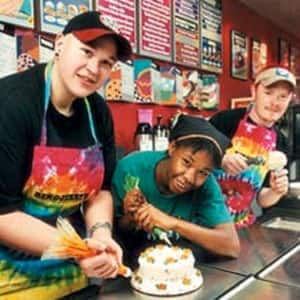 Ben & Jerry’s PartnerShop® Program
Ben & Jerry’s PartnerShop® Program
PartnerShops are Ben & Jerry’s scoop shops that are owned and operated by nonprofit organizations. Ben & Jerry’s waives franchise fees and provides additional support to help these nonprofits operate strong businesses. PartnerShops offer job and entrepreneurial training to youth and young adults that may face barriers to employment. Ultimately, they help people build better lives.
We continue to support two PartnerShops:
- Pittsburgh, PA: The Ben & Jerry’s PartnerShop is owned and operated by Life’sWork of Western PA.
- Portland, OR: The Ben & Jerry’s PartnerShop is owned and operated by New Avenues for Youth.
Learn more about the nonprofits that operate our PartnerShops.
Ben & Jerry’s Flavors for a Cause
Every day around the globe, in scoop shops, shopping centers, and grocery stores, a percentage of sales of certain Ben & Jerry’s products are directed to nonprofit charitable organizations, including Fairtrade organizations. Some of these products include the following:
- Fairtrade Certified – All of Ben & Jerry’s flavors, worldwide, are Fairtrade-certified. As a result, we pay licensing fees to support the work of Fairtrade labeling organizations all around the world. In addition to these royalties, Fairtrade premiums are also paid to farmers – or farmer cooperatives – that grow the wonderful Fairtrade ingredients we use in our products.
- If I Had A Million Flavours® (Canada) – Ben & Jerry’s & Barenaked Ladies teamed up to bring this flavor to our fans in Canada, with a portion of the royalties going to support ABC Life Literacy Canada.
- Phish Food® Ice Cream & Frozen Yogurt – Royalty proceeds from this flavor are paid to the WaterWheel Foundation’s Lake Champlain Initiative, which protects the health of this beautiful lake on Vermont’s western border, and its surrounding watershed.
- Americone Dream® – Royalties are paid to the Stephen Colbert AmeriCone Dream Fund to benefit children, veterans, and the environment.
- Satisfy My Bowl/One Love (Europe) – In partnership with the Marley family, with royalties supporting Partners for Youth Empowerment (PYE), this flavor helps to fund a youth empowerment program in Jamaica.
- One Sweet World (Europe) – In conjunction with various regional charities, this flavor helps fund community projects across the UK & Europe, contributing to a more inclusive world with a little more peace & love.
- The Tonight Dough® – Royalties from this flavor are donated to SeriousFun Children’s Network, a nonprofit organization that helps children with serious illness and their families by providing life changing experiences at camp.
Advocacy & Social Activism Campaigns
North America Overview
During our 2016 North America campaigns, we built a wide network of stakeholders who work on the front lines of racial justice. From more traditional civil rights groups such as the NAACP and our friends at the Beloved Community Center to the new generation of civil rights advocates like Color of Change, Dream Corps, and Dream Defenders. Our unique and engaging company voice provides us an opportunity to engage our fans to think about issues of systemic racism and implicit bias in a way that is perhaps more approachable than some other voices.
Just prior to the start of 2016, we started a learning journey to understand what we as an organization can – and should – do to help make the world a more equitable and just place. Throughout the process we reached out to various social justice organizations, community leaders & advocates to help us understand, and become an advocate, for greater equity & empowerment, inside our communities & beyond.
Through our learning journey, we identified & integrated key equity themes and activations into our US social media communications, including:
- Support for reauthorization of the Voting Rights Act
- Support for the Journey for Justice, a 1,000 mile march to bring attention to ongoing civil rights issues, including criminal justice reform, voting rights, livable wages and equitable public education
- Blog posts on the racial dimensions of the climate justice issue.
Democracy is in Your Hands Campaign
The Ben & Jerry’s Democracy is in Your Hands Campaign is a campaign to bridge the divide between two historically different but intrinsically connected issues: the movement to expand voter access and voting rights and the movement to get big money out the political process. We want to inspire and activate citizens to take action for a more equitable and just society by building a democracy that works for everyone, regardless of race or income.
The Democracy is in Your Hands Campaign was extremely active in the lead up to the November 2016 election. The campaign received strong support from Franchisees across the scoop shop network, through actions such as collecting voter pledge cards from customers to be mailed back prior to the election, reminding them to vote.
Additionally, in North Carolina, we focused heavily on voter registration. We coordinated with a broad coalition of NC groups to support their voter registration strategy, concentrating a great deal of our efforts on college and university campuses, with a specific focus on Historically Black Colleges & Universities (HBCUs).
Beyond our activations, we also sought to engage our fans with content associated with the campaign. The top 10 Democracy is in Your Hands campaign blogs drove more than 40% of the traffic to the ‘What’s New’ section of the Ben & Jerry’s website, with the “7 Ways We Know Systemic Racism is Real” accounting for 6% of visits and driving more than 176,000 page views without any media spend.
Another important success of the campaign over the course of the 2016, is the partner development and movement support. We’ve built solid relationships with key people and groups working on issues of voting rights and systemic racism. Whether Rep. John Lewis and his staff, the team at Demos, our friends at the Beloved Community Center in Greensboro, Umi Selah at Dream Defenders, Cornell Brooks of the NAACP, Rashad Robinson at Color of Change, or Rev. Barber at NAACP NC, these relationships have helped us shape our campaign in a way that is both consistent with and complimentary to the wider movements’ strategies.
Black Lives Matter
There is an awakening happening in our country, a new movement of advocates and activists that are countering the narrative that we’ve moved to a post-racial era. It’s a movement that is standing up for black lives and insists that all of us need to acknowledge the deep systemic structural racism that exists in our country today. It’s a movement that demands that we confront the injustices of the past and present so that we may move forward together to build a nation of liberty and justice for all.
It is true that while we may have fewer overt racists, racism is still deeply embedded within systems like our schools, workplaces, the criminal justice system and hospitals, to name a few. Think about it: because white people occupy a disproportionate number of positions of power in our society it comes at the expense of people of color.
When we took a stand in support of the Black Lives Matter movement, we received a massive response--mostly of overwhelming support, but also mixed with misunderstanding, sincere questions and sadly, some hatred. But one thing became clear: it started a conversation.
Ben & Jerry’s Black Lives Matter Statement
Why Black lives matter.
Black lives matter.
They matter because they are children, brothers, sisters, mothers, and fathers.
They matter because the injustices they face steal from all of us — white people and people of color alike. They steal our very humanity.
Systemic and institutionalized racism are the defining civil rights and social justice issues of our time. We’ve come to understand that to be silent about the violence and threats to the lives and well-being of Black people is to be complicit in that violence and those threats.
We ask you to join us in not being complicit.
There is good news: the first step in overcoming systemic racism and injustice is to simply understand and admit that there is a problem. It’s trying to understand the perspective of others whose experiences are different from our own. To not just listen, but to truly understand those whose struggle for justice is real, and not yet complete.
Rev. Dr. William J. Barber, II, President of the North Carolina NAACP, said it best when reacting to the recent police shooting in Charlotte, NC. He said, “Our objective is simple: to ensure justice-loving people act toward justice, with all evidence, and that we stand together and act from a place of power and love, rather than out of fear and anger.”
It’s been hard to watch the list of unarmed Black Americans killed by law enforcement officers grow longer and longer. We understand that numerous Black Americans and white Americans have profoundly different experiences and outcomes with law enforcement and the criminal justice system. That’s why it’s become clear to us at Ben & Jerry’s that we have a moral obligation to take a stand now for justice and for Black lives.
We want to be clear: we believe that saying Black lives matter is not to say that the lives of those who serve in the law enforcement community don’t. We respect and value the commitment to our communities that those in law enforcement make, and we respect the value of every one of their lives.
But we do believe that — whether Black, brown, white, or blue — our nation and our very way of life is dependent on the principle of all people being served equal justice under the law. And it’s clear, the effects of the criminal justice system are not color blind.
We do not place the blame for this on individual officers. Rather, we believe it is due to the systemic racism built into the fabric of our institutions at every level, disadvantaging and discriminating against people of color in ways that go beyond individual intent to discriminate. For this reason, we are not pointing fingers at individuals; we are instead urging us to come together to better our society and institutions so that we may finally fulfill the founding promise of this country: to be a country with dignity and justice for all.
All lives do matter. But all lives will not matter until Black lives matter.
We ask people to be open to understanding these issues, and not to reflexively retreat to our current beliefs. Change happens when people are willing to listen and hear the struggles of their neighbor, putting aside preconceived notions and truly seeking to understand and grow. We’ll be working hard on that, and ask you do as well.
UK & EU Campaigns Overview
One Sweet World
At a time of increasing division, we launched our One Sweet World campaign in the UK & across our European markets, calling on our fans to come together & share positive community stories, challenge misconceptions of nationality, race wealth & religion. One Sweet World is about unity and social inclusion, and taking steps to help turn the tide on the rise of fear and prejudice around us.
We believe our future prosperity depends on how well we can integrate and harness the diversity of our world – from our brownie makers, to our Fairtrade farmers, right down to the communities in which we operate. We know there is no quick fix to solve social inequality and injustice, but we needed to start somewhere – and Ben & Jerry’s certainly can’t do it alone. Therefore, we called on our fans – and the millions more across Europe – to mobilize in the name of peace, love & community. Through our One Sweet World campaign, we are concentrating our influence to drive positive change by:
- Promoting ideas and actions that drive inclusion and harmony in communities
- Supporting and raising awareness for grassroots initiatives that promote better dialogue between communities, and support building a collective voice of communities to fight the increased influence of corporations
- Ensuring the most basic freedom - the right to vote - by advocating for better access to democracy for marginalized groups in society
- Sharing positive stories of community identity, & the need to come together to share messages of peace and love
Additionally, Ben & Jerry’s provided further support to the campaign through online & social media content – and, of course, with ice cream! Through our One Sweet World video, we reached more than 1 million people across Europe in 2016, with the majority of feedback being positive – “a simple message of unity”. Furthermore, the launch of the Ben & Jerry’s ice cream flavor “One Sweet World” not only generated a lot of great attention to the campaign activities, but sales of the flavor also helped fund the work of our regional partners to promote a stronger sense of community & inclusion, through various community projects, across the UK & Europe.
Some of the organizations we work with to raise awareness of One Sweet World activities & build movements across the different regions of Europe include:
Amadeu Antonio Foundation
The Amadeu Antonio Stiftung is one of Germany's foremost, independent NGOs working to strengthen democratic civic society and eliminate right-wing extremism and other forms of bigotry and hate in Germany. The Foundation is looking to change the narrative on social inclusion in Germany, and we see to work with them to find ways to create impact for communities across Germany. We will be working to promote local volunteering projects within social inclusion that the Foundation runs, using our tours across Germany to promote projects.
Interpeace
Interpeace is an independent, international peacebuilding organization, initially established in 1994 by the United Nations to develop innovative solutions to build peace. Interpeace supports locally led peacebuilding initiatives in more than 21 countries in Central America, Africa, Europe, the Middle East and Asia. Together with local partners, Interpeace helps to establish a process of change that connects local communities, civil society, government and the international community.
HOPE not hate
HOPE not hate seeks to ensure that people across the UK are not denied a voice.  The organization believes that ensuring people have an opportunity to actively participate in the democratic process and articulate their desires and anxieties is one essential way to build stronger communities.
The organization believes that ensuring people have an opportunity to actively participate in the democratic process and articulate their desires and anxieties is one essential way to build stronger communities.
Here at Ben & Jerry’s, we believe everyone deserves to live in one sweet world; a place where all voices are heard, recognized & respected…No matter what the flavor! As we move into 2017, we will continue working on One Sweet World campaign activities & events in local markets, all throughout Europe.
Don’t Get Frozen Out (UK)
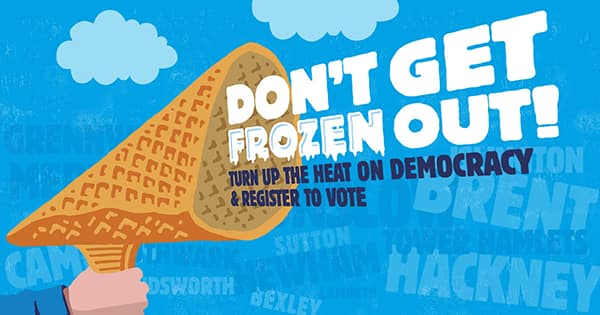 In the lead up to the May 2016 London Mayoral Election, we launched 'Don’t Get Frozen Out', a campaign to encourage Londoners to register to vote & participate in the election.
In the lead up to the May 2016 London Mayoral Election, we launched 'Don’t Get Frozen Out', a campaign to encourage Londoners to register to vote & participate in the election.
Some might ask, “What does ice cream have to do with democracy?” At Ben & Jerry’s, we strongly believe that democracy only works when it works for everyone. So when we learned that recent changes in the UK’s voter registration & electoral laws put many in London at risk of being frozen out of the democratic process, we had to act. We could not stand idly by knowing that one in five Londoners was not correctly registered to vote, while another 329,000 more had been removed from the electoral register in December 2015 (many without even knowing it)!
With the help of our friends at HOPE not hate, the ‘Don’t Get Frozen Out’ campaign sought to encourage young Londoners to find out why the London Mayoral elections matter to them, to encourage them to register to vote, and to proudly fill out that ballot paper in the mayoral elections. But equally as important, we encouraged our fans to take that extra step of taking a leadership role in their community, & exciting their friends, family & neighbors to join the process. Some of the support we provided, through Hope not hate, included:
- Setting an overall goal to register 5,000 voters by the registration deadline (April 18, 2016);
- Informing potential voters where they could attend upcoming Voter Registration drives in their area;
- Providing “Democracy Packs” (complete with Ben & Jerry’s ice cream vouchers!) to help our fans run successful Voter registration drives in their community, workplace, campus, place of worship, etc.;
- Create buzz, raise awareness, Tweet & share the enthusiasm with their own personal networks;
- …And most importantly, get out and vote!
Through the hard work of the Ben & Jerry’s team, Hope not hate & our many, many engaged fans, the target of registering 5,000 citizens was achieved in just over a month. While the campaign has ended, the Ben & Jerry’s team in the UK has continued the work to build a movement around the issues of democracy in the UK. Some of the enduring benefits of these efforts include building connections with various MPs and Lords; being invited to attend a Parliamentary group that meets on a quarterly basis to discuss democratic participation; and opening up conversations with a number of other advocacy groups in the democracy space.
Aux Glace Citoyen! (France)
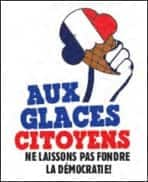
In 2016, we were proud to launch Ben & Jerry’s first ever dedicated Social Mission activism Campaign in France: Aux Glace Citoyen! Since France has a presidential election coming up in 2017, our efforts over the course of 2016 focused on voter registration efforts, to maximize the number of people who sign up to vote ahead of the registration deadline of December 31, 2016.
As we move into 2016, the focus will shift from voter registration to activation – with calls to action that focus on:
- Maximizing the number of voters that turn out for the 2017 presidential elections
- Raise awareness of Aux Glaces Citoyens democracy campaign and calls to action amongst our fans, aspiring activists, civil society and other stakeholders
- Encourage youth participation and engagement in French society
We look forward to updating you on the results of Aux Glace Citoyen in next year’s report!
Asia-New Markets Campaign Overview
Climate Justice
For us, the issue of climate change is not just an environmental issue. It’s a serious threat the poorest and most vulnerable people on the planet. This problem has largely been caused by wealthy, developed nations of the global north, while the least developed nations of the global south are most at risk, and have the least resources to adapt to a rapidly warming world. It’s a matter of human rights and social justice. Additionally, as an ice cream company, many of our partners throughout our value chain, including our Fairtrade suppliers in the global south, are at real risk from a warming planet. And because climate change is a risk to people in our supply chain, it’s also a risk to our business.
Here’s a sampling of some of the ways Ben & Jerry’s we engaged our fans & raise awareness on the subject in some of our new & growing markets.
Climate Justice (Japan)
In Japan, we continued our climate justice work with the evolution of the “Save our Swirled” campaign. Following electricity deregulation in April 2016, we worked to educate our Japanese fans on our global climate goal to achieve 100% clean energy by 2050, and asked them to do their part & sign the Avaaz petition, encouraging the Japanese government to meet Paris climate commitments. Additionally, through Powershift, we challenged them to personally make the switch to renewable energy.
Climate Justice (Singapore)
Working with Eco Singapore, Ben & Jerry’s supported the inaugural ‘Eco Film Festival’. Showcasing a number of inspirational and thought provoking films, we were on hand to serve ice cream and ask people to consider what they can do to make a difference. To help raise awareness & encourage conversation, our goal was to target +1,000 conversations over the 2 two day event.
Climate Justice (Australia)
Working with 350.org Australia, we kept up our campaign to keep our fans aware and engaged in the need to advocate that Australia move away from fossil fuels and support the development of renewable energy.
Additionally, in Australia, outside of our Climate Justice work, we wanted to note that 2016 was our fourth year running in advocating for Marriage Equality.
Employee Wellbeing & Culture
Our Values in Action
Livable Wage
Ben & Jerry’s is committed to paying all of its workers a livable wage, and our Livable Wage policy continues to cover all full and part-time employees in our Vermont manufacturing plants and in all of our company-owned scoop shops. In 1995, we established a methodology for calculating a livable wage benchmark for Vermont. We defined it as the starting wage for a single person that will sustain a reasonable quality of life, taking into consideration essential expenditures on needs such as:
- Housing, utilities & transportation
- Nutritious food
- Out-of-pocket health care.
- Recreation
- Savings, taxes, and miscellaneous expenses
In 2016, we paid an entry-level hourly livable wage rate of $17.09, which translates to approximately $35,547, per year. To put this into some context, at year-end 2016, the Vermont minimum wage was $9.60/hr ($19,968/yr), while the federal minimum wage was $7.25/hr ($15,080/yr). On January 1, 2017, the Vermont minimum wage increased to $10.00/hr ($20,800/yr), while the federal minimum wage has remained constant since 2009.
We continue to review how our livable wage stands up for the primary employees who make Ben & Jerry’s products outside of our Vermont manufacturing sites; including Hellendoorn, in the Netherlands. We believe, based upon local standards, that our livable wage is met at those sites. Because this is an extensive process to complete globally, we focus yearly reviews on the US.
Tracking Ben & Jerry’s Livable Wage (Vermont)
- 2016 - $17.09
- 2015 - $16.92
- 2014 - $16.29
- 2013 - $16.13
- 2012 - $15.97
- 2011 - $15.34
- 2010 - $14.64
In addition to our well-known Livable Wage policy, a few of the other Linked Prosperity policies that help make life here at Ben & Jerry’s a bit more wonderful include:
Employee Hybrid Car Incentive
Employees who decide to purchase a vehicle that meets or exceeds the Hybrid vehicle criteria, (i.e. - vehicle powered in a combination of gas & some other environmentally friendly power source such as electric, solar, hydrogen, etc.), may receive a reimbursement of $1,000! Employees are eligible to take advantage of this benefit once every three years.
#1 Employee Perk of All-Time: Three Pints a Day
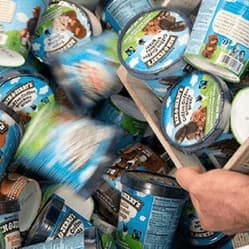 Yes, you did read that correctly! Since the early days of the Company, all Ben & Jerry’s employees are entitled to take home three free pints a day. Recent unscientific studies seem to indicate a direct relationship between the number of pints an employee has in his or her freezer, and the number of friends he or she has!
Yes, you did read that correctly! Since the early days of the Company, all Ben & Jerry’s employees are entitled to take home three free pints a day. Recent unscientific studies seem to indicate a direct relationship between the number of pints an employee has in his or her freezer, and the number of friends he or she has!
Summer Hours Policy
Running from Memorial Day weekend through Labor Day, Ben & Jerry’s “Summer Hours” policy offers employees based in our Central Support Office the opportunity to leave a bit early on Friday afternoons, beginning as early as lunchtime.
We trust our fabulous employees to complete all work-related responsibilities before taking advantage of an early start to the weekend (…and not to forget their three pints on the way out the door!). Needless to say – when the snow finally melts & that elusive summer sun emerges – 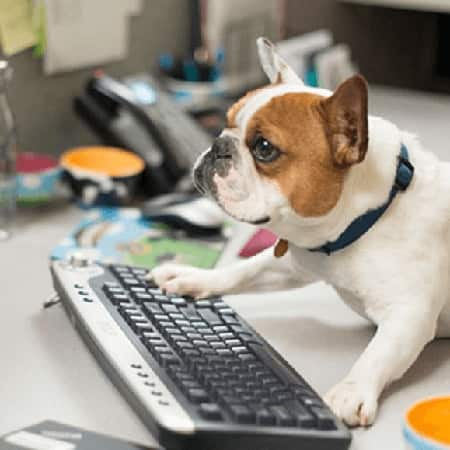 everyone around here is extra motivated to finish their weekly workload early, in order to maximize the time spent floating around on Lake Champlain; exploring the trails of the Green Mountains; or simply spending a few extra hours in the company of friends & family.
everyone around here is extra motivated to finish their weekly workload early, in order to maximize the time spent floating around on Lake Champlain; exploring the trails of the Green Mountains; or simply spending a few extra hours in the company of friends & family.
K-9 to 5’ers
Here at Ben & Jerry’s, we love dogs! In fact, we love our dog friends so much that they’re welcome to join us for a hard day’s work in our Central Office in South Burlington, VT. It builds on our strong sense of community here at B&Js, making life just a bit more fun. As our CEO says, “it hard to stay mad when you have a dog nearby.”
If you would like to meet some of our special co-workers, then check out our K-9 to 5’ers page.
Organization Model and Intentional Culture
Our business is pivoting into a truly global enterprise with the opportunity to have an impact on social and climate justice, across five continents. We are on a journey to build a more resilient, high performance and inclusive business model that can meet the exciting challenges in front of us.
Looking at the bigger picture, we are building a team-based network of our own design. We will have more connected and better aligned teams, with well-defined roles. In a traditional leadership model, decision-making is concentrated in a small group at the top of the organization, which is inefficient and encourages bureaucracy. Our new model distributes decision-making and trusts teams with relevant expertise to come up with the best answers. These teams will be tightly networked to optimize synergies, with a focus on fewer meetings and more real team work, using a clear and simple decision making framework. It is also a pragmatic way to nurture global collaboration and intentional culture and practices—it is walking the talk on a global scale.
Additionally, we are striving to become a stronger, more equitable business by continuing our journey toward building a culture and workplace that better reflect our values & communities. This forever work is called “living our values from the inside, out.”
This work is extremely important to us – and equally challenging – so we’ve made every effort to proceed thoughtfully, to engage & educate our employees throughout the process, and encourage dialogue to help ensure successful culture shift. Over the course of 2016, some of the actions we’ve taken include:
- Implementation of an intentional recruiting & hiring process. We will need more robust recruitment to attract the best talent out there and a workforce that reflects the country and our increasingly interconnected global marketplace.
- Offering additional training and development opportunities tied to building on our culture and ways of working together, which are required to be a truly global community able to deliver growth and social impact.
- Participating in the Human Rights Campaign Corporate Equality Index to stay current with our practices.
- Completing the B-Corp re-certification process & participating in the B Corp Inclusion Challenge to benchmark our People Practices.
- On-boarding of a new Ben & Jerry’s-dedicated recruiter with significant experience and strong networks in recruiting people of color.
Furthermore, the sections below offer a bit of background on some of the additional steps we’ve taken over the last year, in an effort to cultivate a more equitable, inclusive culture.
Competencies & Learning Curriculum
Throughout 2016, we continued to seek out new and innovative opportunities to build on the competencies and skills we all need in order to contribute to our People Mission, and deliver strong performance in the face of an increasingly challenging & uncertain world.
We launched a people management course to provide an opportunity for each manager to reflect on where his or her strengths and weaknesses lie on seven essential skills of management. Further adding value to the experience, the exercise also provided the opportunity to find out what his/her team, manager, and peers think, too.
Moreover, Ben & Jerry’s Leadership Team will need to evolve its ways of working to fully unleash the potential of our employees, associates and partners in ways that will be sustainable for the long term. To help us build the skills required to achieve this outcome, we have engaged a leadership expert to support us in this process. This experience teaches leaders to bridge the gap that sometimes exists between what you know, and what you can actually do under pressure through experiential learning. The program was started in December 2016 and will continue into 2017.
Equity and Inclusion Foundational Workshops
In spring 2016, employees from our Vermont-based Central Office (headquarters) & manufacturing sites, came together in cross-functional groups for the first in a series of foundational workshops. A few months later, the foundational workshops were further rolled out to Ben & Jerry’s employees based on our European office in Datchet, United Kingdom.
These workshops had three specific objectives:
- A shared foundation of core concepts, frameworks, and language to begin an intentional learning process and to set expectations for all staff about the learning journey required to accomplish our ambitious goals for internal culture, high performance, and values integration from the inside-out.
- Engagement with other employees, specifically on the topic of workplace culture and teamwork, to learn about each other’s experiences and observations.
- An opportunity to provide additional input on company and workplace culture priorities and to identify specific next steps employees want to take—as individuals, as teams, and company-wide.
Ultimately, attendees developed deeper knowledge on equity and talked openly about what it will take to create a stronger, more consistent, sense of belonging across our team.
The Inclusion Ingredient
Starting in 2015 and continuing in 2016, we began offering a half day course designed to allow participants to explore the way they perceive the world and what influences their decision making. The program helps participants understand why biases occur, and what it feels like when these biases lead to exclusion. Furthermore, it provides them with a means of engaging in situations, and fostering inclusion rather than being a bystander.
Recruitment & Hiring
In 2016, we worked toward crafting a robust hiring and recruitment system, which would be grounded in our foundational values of justice and equity. The process had to be fair, inclusive, and consistent – and help us identify the most highly-skilled & talented candidates, from across our increasingly interconnected global marketplace. The result was a 13-step recruiting and hiring process, which was rolled out during the summer of 2016. We strive to increase difference in our candidate pools and hires.
Additionally, our Vermont Manufacturing sites pride themselves on inclusion and hiring for difference based on age, gender, tenure, sexual orientation, veteran status, parental status, situation of life, race, and many other factors.
Furthermore, we introduced “Interviewing 101”, a short, introductory training program that makes the case for equity and inclusion in the interview and selection process and describes the new guideline, as well as offering pointers on preparing for and conducting interviews, and avoiding legal and other pitfalls.
Environment & Climate
Carbon Reduction Program
In 2014, we completed an extensive life cycle analysis (LCA) of Ben & Jerry’s products – made in both North American & European factories – to better understand our Greenhouse Gas (GHG) emissions. This initial LCA work was conducted by CoClear, a startup team (at that time) from Columbia University, who approached us with the opportunity to beta test their modeling process. Through CoClear’s comprehensive evaluation, we not only gained a deeper understanding of the GHG footprint of our products “from cow to cone”, but also acquired the critical baseline information necessary to start to an in-depth process of formulating our ambitious carbon reduction strategy.
In 2016, our strategic consulting firm, Pure Strategies, began the process of verifying the underlying calculations behind our LCA study & making important revisions in areas where we had since gained access to stronger data & better assumptions. Based on these revisions, we have updated the data – and our adjusted emissions estimate is 1.4 kg/pint (vs. 1.0 kg/pint). This difference makes our already challenging goals that much more impressive.
Furthermore, this review process was essential as we continue working to align our carbon reduction goals with the Science Based Targets Initiative (SBTi), which are targets developed by companies to reduce GHG emission to the level of decarbonization required to keep global temperature increase below 2º C compared to pre-industrial temperatures.
As of early 2017, we have leveraged the results of our LCA studies – and input from our expert consultants – to complete the prerequisite steps of defining the scope & boundaries of our carbon reduction strategy. We are currently in the process of finalizing our short- & long-term carbon reduction targets, and ensuring they meet the requirements of SBTi. We look forward to telling you more about these ambitious goals very soon!
Proposed Science Based Targets (SBT) Boundaries
To help define boundaries and to delineate areas of responsibility we have focused on the industry standard of the GHG Protocol developed by the World Resources Institute (WRI). The SBT Initiative is a collaboration between WRI, UN Global Compact, World Wide Fund for Nature and Carbon Disclosure Project are the partner organizations in collaboration with We MEAN BUSINESS. The table below identifies the boundaries that Ben & Jerry’s has included in our GHG reduction strategy.

Looking Forward – 2017 and Beyond
Progress towards the revised goal of 1.4kg/pint has taken time as we have had to create programs and establish baselines in order to implement changes. While the progress in 2016 was not as strong as we had hoped, we expect the changes in our approach will help us achieve greater success in 2017.
Over the course of 2017, our areas of focus will include:
- Dairy Farm technology to reduce GHG emissions
- A Franchise program to create a baseline and recommend reduction opportunities
- Identifying R&D opportunities
- Manufacturing efficiencies
We continue to direct the resources of the carbon fund towards initiatives that will build a program that will deliver GHG reductions.
Packaging
For years, Ben & Jerry’s has been working to reduce the negative environmental impacts associated with our packaging materials. While we continue to search for new and innovative packaging options for our products, this remains an extremely challenging task due to strict requirements for food packaging – and the need for materials to withstand temperatures of 20 degrees below zero (F).
Pint Cartons and Novelty Boxes
While food contact regulations prevent us from using post-consumer recycled material in our pint containers, all Ben & Jerry’s cups & lids, worldwide, is made from Forest Stewardship Council (FSC) Certified paperboard. FSC certification means that the pulp in the paperboard comes from forests that are managed for the protection of wildlife habitat, maintenance of biodiversity, and other forest sustainability criteria. Again, we continue to follow packaging industry developments into food-safe coatings made from renewable materials – an important next step towards development of packaging that's biodegradable and fully compostable.
During 2016, we commenced production on our fantastic new line of ‘Pint Slices’ novelty products. The paperboard used in the packaging materials for these new novelty products is made from virgin, non-FSC certified, paperboard – however, we are in the process of transitioning this packaging material to sustainably sourced paperboard.
Scoop Shop Materials
On an ongoing basis, we are working to improve the materials used in Ben & Jerry’s scoop shops, such as bowls, spoons, drink cups, and napkins. For example, in the U.S., we have used unbleached paper in our napkins for many years and our drink cups, while made of plastic, are recyclable and have been light-weighted to use as little material as possible.
Corporate Office Materials
In our corporate office, we have made significant strides in using environmentally friendly materials, including 100% post-consumer recycled and process chlorine-free paper; compostable dinnerware, green cleaning solutions, low-VOC paints, and flooring that is recyclable.
Review Report of Independent Accountants
Independent Auditor's Report
For our 2016 report, we engaged Moss Adams LLP, an independent accounting firm, to review specific Quality of Results indicators that Ben & Jerry’s set as priorities for the year.
